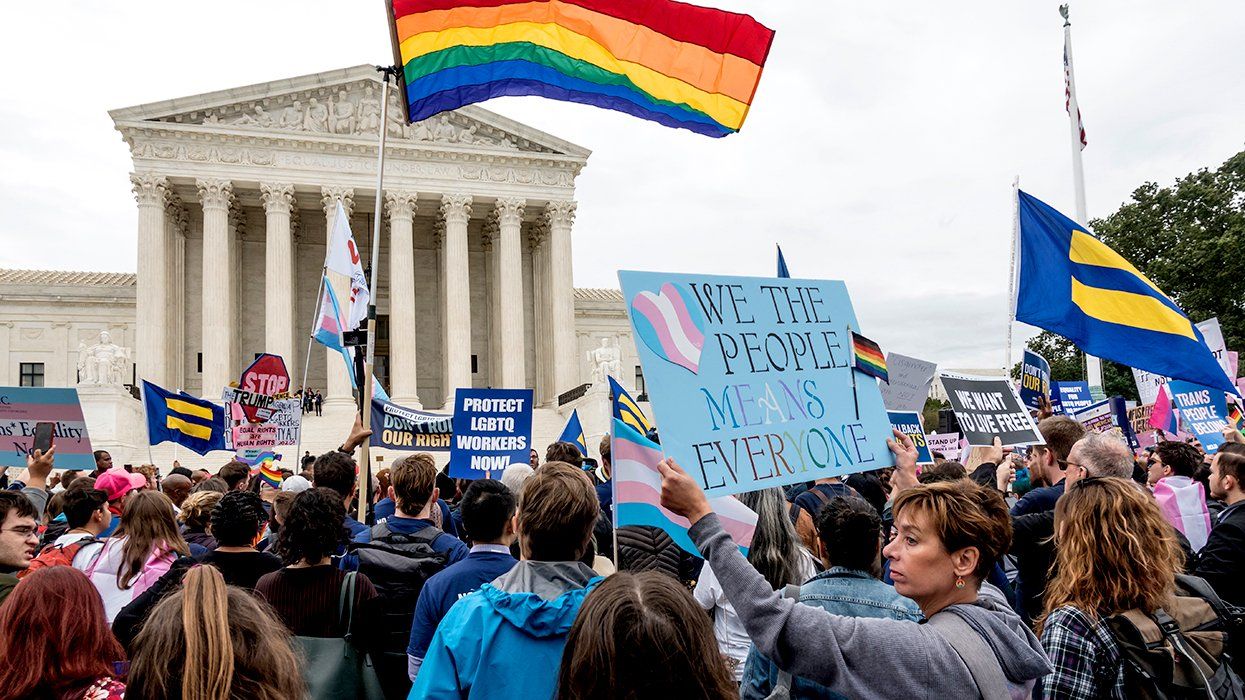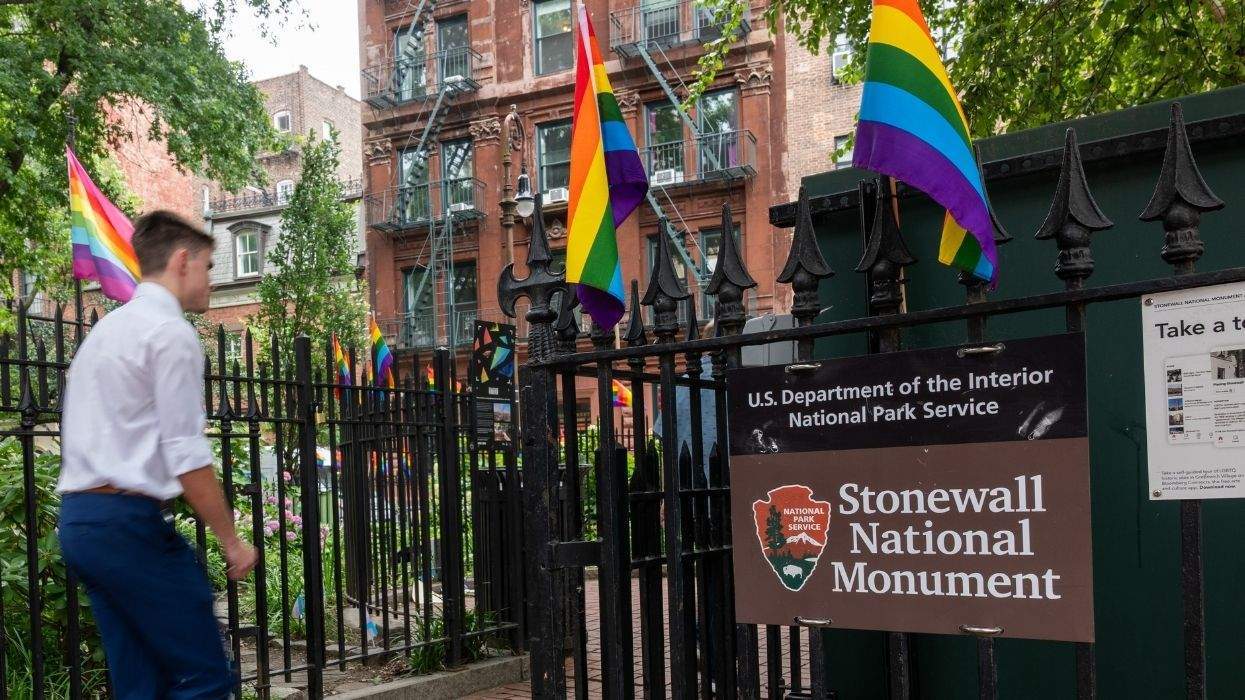The controversy over gender-affirming care for trans minors has come to the U.S. Supreme Court. Oral arguments began today in U.S. v. Skrmetti, a case over a Tennessee ban on such care. Here’s what you need to know about the case, which is the high court’s first opportunity to rule on the issue.
Keep up with the latest in LGBTQ+ news and politics. Sign up for The Advocate's email newsletter.
What is the U.S. v. Skrmetti Supreme Court case?
In March 2023, Tennessee Gov. Bill Lee, a Republican, signed Senate Bill 1 into law. It bans surgery, puberty blockers, and hormone treatment for the purpose of gender transition for people under 18. The following month, three families with transgender children and one doctor filed a federal lawsuit challenging the law.
The suit was brought by Samantha and Brian Williams of Nashville and their 15-year-old transgender daughter, two other plaintiff families filing anonymously, and Dr. Susan Lacy of Memphis. They are represented by Lambda Legal, the American Civil Liberties Union and its Tennessee affiliate, and the law firm of Akin Gump Strauss Hauer & Feld LLP. The suit was filed in April 2023 in U.S. District Court for the Middle District of Tennessee. The case was known as L.W. v. Skrmetti until the Biden administration joined it, and it is now U.S. v. Skrmetti.
Related: Meet the transgender lawyer leading a bold fight to show Supreme Court justices that trans lives matter
It names as defendants Tennessee Attorney General Jonathan Skrmetti, the Tennessee Department of Health, the Tennessee Board of Medical Examiners, and various state officials.
The suit argues that the law violates the U.S. Constitution’s guarantees of equal protection and due process as well as the Affordable Care Act’s Section 1557, which bans sex discrimination in health care.
“It was incredibly painful watching my child struggle before we were able to get her the lifesaving health care she needed. We have a confident, happy daughter now, who is free to be herself, and she is thriving,” Samantha Williams said in a Lambda Legal-ACLU press release when the suit was filed. “I am so afraid of what this law will mean for her. We don’t want to leave Tennessee, but this legislation would force us to either routinely leave our state to get our daughter the medical care she desperately needs or to uproot our entire lives and leave Tennessee altogether. No family should have to make this kind of choice.”
What's at stake here for gender-affirming care?
“Our legal challenge is limited to the provisions of Tennessee’s ban targeting hormone therapies — such as hormone replacement therapy and puberty blockers — and does not implicate surgical care,” the ACLU explains on its website, as genital surgery is almost never performed on minors.
“Tennessee’s ban, like every other passed by politicians in recent years, specifically permits these same hormone medications when they are provided in a way that Tennessee considers ‘consistent’ with a person’s sex designated at birth,” the ACLU continues. “This means, for example, a doctor could prescribe estrogen to a cisgender teenage girl for any clinical diagnosis but could not do the same for a transgender girl diagnosed with gender dysphoria.”
"The ban violates the U.S. Constitution by denying the same treatments for transgender youth that are commonly provided to cisgender youth," Sasha Buchert, Lambda Legal’s Nonbinary and Transgender Rights Project director, said in a recent Q&A on the organization's website. "Decisions about medical care properly lie with families and their doctors, and politicians shouldn’t be inserting themselves in these personal and private discussions."
A ruling upholding the law could have implications for other types of health care, the ACLU warns. “When arguing against transgender people and their families, states with bans like Tennessee’s have relied heavily on the Supreme Court’s opinion Dobbs v. Jackson Women’s Health Organization, which overturned Roe v. Wade and allowed states to ban abortion,” the organization notes. “U.S. v. Skrmetti will be a major test of how far the court is willing to stretch Dobbs to allow states to ban other health care. The court’s ruling could serve as a stepping stone towards further limiting access to abortion, IVF, and birth control.”
“We want people to understand that this doesn’t start or end with the government intrusion into the decision-making of trans families," ACLU lawyer Chase Strangio, who is set to argue before the Supreme Court, said in an Advocate interview. "This is part of a broader agenda to limit people’s abilities to access medical care, which they need to make decisions that are right for them.” He will be the first out trans person making an argument at the court.
"There are a range of different outcomes that are foreseeable in a final ruling," Buchert said. "A ruling in favor of the families would return the case to the lower courts to apply the appropriate standard of review for improper sex-based classifications. If the Court upholds the ban, the Tennessee law would remain in effect, depriving trans minors from receiving hormone therapy, greenlighting similar bans already enacted in other states, and potentially emboldening even more states to pass similarly restrictive laws and perhaps even more draconian bans. However the case is decided, it is likely to have a significant impact on how much deference courts give to bans on medical care to treat gender dysphoria."
Support queer media. Become an Advocate contributor today.
"Beyond this case, the Supreme Court may soon address other issues affecting transgender rights," Buchert added. "For example, West Virginia and North Carolina have recently asked the U.S. Supreme Court to review rulings out of the U.S. Court of Appeals for the Fourth Circuit in two successful lawsuits brought by Lambda Legal challenging each state’s policies denying medical care for transgender people, specifically transgender state employees in North Carolina and transgender Medicaid beneficiaries in West Virginia. West Virginia has also asked the Court to review another ruling out of the Fourth Circuit where Lambda Legal, the ACLU, the ACLU of West Virginia and Cooley LLP successfully challenged West Virginia’s law barring transgender girls from participating in interscholastic athletics. There is a lot at stake for trans and nonbinary people in the upcoming cases and Lambda Legal is working around the clock to represent our trans and nonbinary community and fight back against these attacks."
How did U.S. v. Skrmetti get to the Supreme Court?
U.S. District Judge Eli Richardson granted a preliminary injunction in June 2023, blocking the law from being enforced. However, a three-judge panel of the U.S. Court of Appeals for the Sixth Circuit lifted that in September 2023. So the plaintiffs are asking the court to review the Sixth Circuit’s decision.
Solicitor General Elizabeth Prelogar, representing the Biden administration, emphasized the need for the court’s intervention, highlighting the “profound uncertainty” faced by transgender adolescents and their families due to conflicting lower court decisions. “This Court’s input is urgently needed to resolve whether these bans are discriminatory,” she said in the government’s petition to the court.
The high court announced in June that it would hear the case.
How might the court rule?
It’s anyone’s guess. The court delivered a major victory for LGBTQ+ people in 2020 in Bostock v. Clayton County, in which it ruled 6-3 that workplace discrimination based on sexual orientation or gender identity is sex discrimination and therefore banned by Title VII of the Civil Rights Act of 1964. Justice Neil Gorsuch, Donald Trump’s first Supreme Court appointee, wrote the ruling. He was joined by another conservative, Chief Justice John Roberts, and the court’s four liberals — Ruth Bader Ginsburg, Elena Kagan, Sonia Sotomayor, and Stephen Breyer. Dissenting were conservatives Samuel Alito, Brett Kavanaugh, and Clarence Thomas.
Now the court’s makeup has changed, however. Ginsburg died in 2020 and was replaced by a conservative, Amy Coney Barrett. Breyer retired in 2022 and was succeeded by another liberal, Ketanji Brown Jackson, the first justice appointed by President Joe Biden.
And while Gorsuch and Roberts joined in the Bostock ruling, now the conservatives appear to have dug in, as indicated by the Dobbs ruling, the 6-3 presidential immunity ruling, and the ruling in 303 Creative Services v. Elenis, also 6-3. In the latter, the majority held that Colorado’s LGBTQ-inclusive nondiscrimination law violated a web designer’s freedom of speech — the designer was willing to create wedding websites for heterosexual couples only.
But the plaintiffs have many on their side. In addition to their legal team, they have numerous friend-of-the-court briefs supporting their case. Such briefs are filed by parties not directly involved in a case but wanting to offer an opinion. They have come from both Democratic and Republican politicians, Planned Parenthood, the American Bar Association, the American Psychological Association, the National Women’s Law Center, the American Academy of Pediatrics, trans youth, and many more. Of course, there have been briefs filed supporting Tennessee as well. So we’ll see who convinces the justices.















Charlie Kirk DID say stoning gay people was the 'perfect law' — and these other heinous quotes
These are some of his worst comments about LGBTQ+ people made by Charlie Kirk.